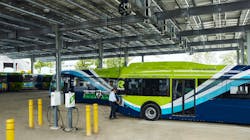OP-ED: To Serve All Americans, Focus on Fleets in the EV Transition
Is 2023 the year of the electric vehicle? From big budget ads in the Super Bowl to photo opps with President Biden, EVs from Tesla, Ford, Jeep and Dodge are in the spotlight, as manufacturers seek to appeal both to American consumers’ love of trucks and SUVs and to the climate-conscious and Congress and the Biden-Harris Administration have made the EV transition a priority, with generous tax credits for purchases of EVs (including used models, which are a more sustainable choice) and investment in high-speed charging across America’s highway system.
While EVs of all types are a critical ingredient for a future of low-carbon mobility, we must not lose sight of the importance of transitioning the nation's fleets to zero-emission vehicles. Fleets, which include public utilities like buses, mail delivery and snow removal, as well as private taxi, for-hire-vehicle, freight and delivery services, account for 21 percent of all emissions in the transportation sector.
What’s more, emissions released by fleets disproportionately impact historically disinvested communities–studies have shown diesel emissions from heavy trucking are significantly higher in low-income neighborhoods and communities of color and a system of tax credits for the purchase of personal EVs leaves out Americans who do not have access to a private vehicle. While only six percent of white Americans do not have car access, that number skyrockets to 18 percent for African Americans. To serve these communities, immediate steps must be taken to reduce emissions in our nation’s fleets.
During the past several years, public transportation agencies in the U.S., Europe and Asia have taken major steps toward electrifying their bus fleets, as have private institutions such as universities and corporations. Transit agencies in Boston, New York, Los Angeles and others have all made public commitments to full bus electrification within the next two decades. Electrification not only provides for cleaner buses, it also gives transit agencies a much-needed opportunity to modernize maintenance garages, many of which are decades old and no longer workable for today’s needs.
Montgomery County, the most populous county in Maryland, recently opened a microgrid to power its electric bus fleet. The county redeveloped an existing bus facility into the Brookville Smart Energy Bus Depot in order to enable a 62 percent reduction in carbon emissions. This work, which Arup supported, provides a template for how public transit authorities and other fleet owners can transition to cleaner and safer facilities, renewable energy and electrified fleets.
Lessons learned from electrifying public transit can serve as a model for the electrification of other types of vehicles, even unexpected ones like tractors, medium-duty vans and firetrucks. Electrified fleets mean cleaner air, less climate impact and better public health, especially for low-income communities that have suffered from decades of transportation decision-making that leveled vibrant commercial districts, displaced people and replaced functioning neighborhoods with highways and left the remaining residents with generational health and safety problems.
The electrification of fleet vehicles is not without its challenges. The upfront costs of both the vehicles and the necessary charging infrastructure can be high, technical choices are complex, grid outages remain a risk and growing pains are inherent in any major change. However, these challenges are being incrementally solved by different entities working together to form partnerships and push the needle to accelerate change.
We have a long way to go before truly net-zero transportation systems are the norm in our cities and on highways around the world, but the technology and solutions necessary are available now – and getting better all the time – for those willing to lead the change.
Kate Fichter is an Associate Principal and Americas East Transportation Decarbonization Leader at Arup.
Geoff Gunn is an Associate Principal and Americas East Energy Leader at Arup.

Kate Fichter
Kate Fichter is an associate principal and americas east transportation decarbonization leader, based in Arup’s Boston office. Having joined the firm in 2022, she brings decades of experience in the advancement of public transit and other sustainable mobility modes and policies, including state climate initiatives and transportation decarbonization strategies. Prior to joining Arup, she was the assistant secretary and chief of climate and decarbonization at the Massachusetts Department of Transportation.

Geoff Gunn
Geoff Gunn is an associate principal and americas east energy leader, based in Arup’s Boston office. As a trained electrical engineer, he has helped clients assess and improve energy resilience, enhance sustainability through implementation of renewables and decarbonization strategies and manage their energy costs with energy efficiency improvements and demand reduction strategies such as energy storage. Since joining Arup in 2007, Geoff has led complex assignments with diverse, multi-disciplinary teams, where he aims to understand his clients' needs and delivers projects specifically designed to satisfy those requirements.




